By Donald E. Simanek.
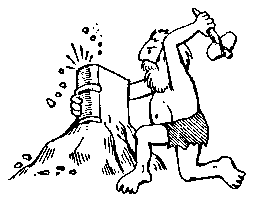
Illustrations by John C. Holden
If the know-nothings ever take over the country completely and pass a law that everyone must subscribe to a religion on pain of imprisonment, I know the one I'd choose. It is a religion which does a better job of accounting for life, the universe and everything than any of the major or minor religions.
Many religions make the mistake of assuming that there is only one god, who is said to be all-wise and all-powerful. That just doesn't square with experience. Look around you at this universe you are in. See what a mess it is? Sure, it "works", after a fashion, but an all-wise and all-powerful god surely could have made it better, and simpler to understand.
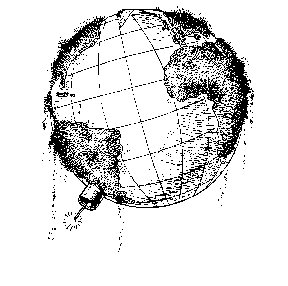
Mankind: a crawling disease on the face of the earth.
And look at man, said to be god's greatest creation. Can you imagine any god being proud of such handiwork? Can god do no better at the creation business than to make mankind, a pathetic crawling disease on the face of the earth?
Some religions explain away these obvious facts by inventing an evil supernatural being, a devil, who continually thwarts god's good intentions. But the price paid for this apologetic is to admit that god is not quite all-powerful, or that perhaps god, for inscrutable reasons, permits evil to exist, even though having the power to eliminate it. It has been said that all existing religions fail when they try to confront the problem of the existence of evil.
It just doesn't wash. My new religion resolves these difficulties completely. Here's its basic tenets, in condensed form.
THE universe was created a long, long time ago (in
fact, predating time itself), in a place far, far away (beyond space itself) by a
committee of gods, no one knows how many (numbers hadn't yet been invented). They were not
all-powerful, just more powerful than anything else in their neighborhood. Individually
they were extremely capable, for they had truly universal minds. But it occurred to them
that there's little point in having a universal mind if there isn't any universe. So they
undertook to create one, for they also had creative minds, and there's little use having a
creative mind if you don't create something now and then, if only for practice.
The committee designs the universe
Now each of the gods knew he (or she, or it--sex hadn't yet been invented) could create
a perfect universe. Each knew the others couldn't do as well. It soon became apparent that
each god had a different conception of perfection.
They worked for cosmic aeons on the design for a universe. Plans were drawn up, argued
over, and scrapped. Prototype models were made, modified, reworked and recalled for
defects. Arguments over details became heated. The deliberations were unruly and chaotic,
for
In desperation, to get the job done, each god agreed to assume responsibility for
certain parts of the project, which would later be integrated into the whole. But since
each part interacted with every other part, the gods could not agree how to put them
together into a unified universe. So, obviously they never got around to a unified field
theory. The most difficult part was man, whom the gods had unwisely decided to make in
their own image.
Eventually the arguments became so heated that the gods got into furious argument
followed by a god-awful row of cosmic proportions. [This was the big bang which
scientists have called the beginning of the universe as we know it.] When it was over, all
of the gods had been killed. The heavens looked like the aftermath of a Shakespearean
play. The debris of the battle scattered far and wide: time and space, matter and energy,
light and darkness, super-strings and sealing-wax, and a lot of dust--all the raw
materials which the gods had gathered and fashioned for later assembly into such things as
stars, planets and intelligent life.
A god-awful row!
Fortunately the prototype plans for assembly had already been installed,
in the form of universal laws of physics; for the gods, being lazy,
had planned the universe to be self-assembling. Out of this chaos,
the raw materials coalesced into some semblance of order.
So we find ourselves in an unfinished, imperfect universe, with no gods left to set
things right. We are on our own, to make the best of a bad situation we didn't ask to be
in.

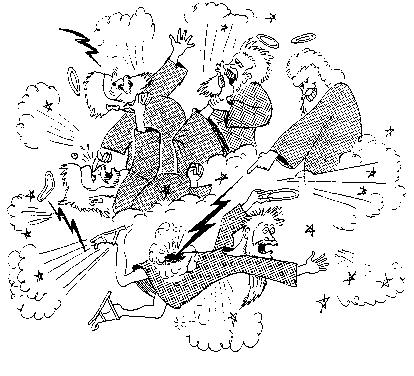
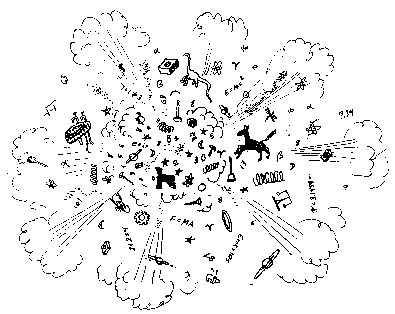
The big bang.
One unique feature of this religion is that there remain no god or gods to pray to, no heaven or hell. There's no sacred literature, either, for the gods never got a chance to dictate the final committee report.
Yet this religion does a better job of explaining the existence and present condition of the universe and the human situation than any other. It is also in harmony with the operation and results of committees even today.
Now I don't claim this is the one true religion. But it certainly makes more sense than all those false religions vying for the allegiance of mankind. Why, you ask, do I presume to call the others false? Well, they call each other false, and in that appraisal they may all be right!
I certainly wouldn't ask you to believe in this religion. That's exactly where most religions go astray. It is my view that religions are relatively harmless until you start to believe in them.
However, if you'd care to send money...
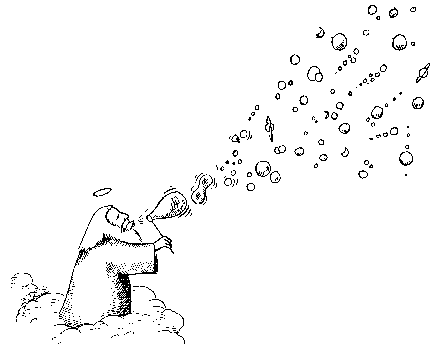
First published in The Vector, No. 17 (Late 1988).
Text © 1988 by Donald Simanek.
Illustrations © 1988 by John C. Holden.
Of course, there are other religions which account for the observed facts rather well. I like this one from Mike Royko, who was, for many years, a syndicated columnist of the Chicago Tribune.
…I am a member of the Church of Asylumism and believe it is the one and only
true faith…
Our church was founded by Dr. I. M. Kookie, one of the world's leading experts on lots
of things. In our church, he is called the Prophet Kookie.
As Prophet Kookie has revealed in the Book of Kook, man is not native to this planet.
He did not evolve from monkeys, as some people believe, or descend from Adam and Eve, as
others insist.
Millions of years ago, a highly advanced race of peaceful, happy beings on a distant
planet had a perfect society. But they developed a social problem. A few hundred of them
became deranged. Their madness took different forms. Some stole or became violent. Others
tried to become lawyers. Some wanted to form political parties. And a few claimed that God
spoke to them and told them how everybody should live.
So they were rounded up, put on a spaceship, and a search was made for an uninhabited
planet that would serve as an asylum. They found this planet.
 This material is © 2002 by
The Institute of Physics Publishing and appears in the
science humor collection
Science Askew.
by Donald E. Simanek and John C. Holden.
You may order it directly from the publisher:
Order your copy now!. Allow 7 to 10 days for delivery in the USA.
This material is © 2002 by
The Institute of Physics Publishing and appears in the
science humor collection
Science Askew.
by Donald E. Simanek and John C. Holden.
You may order it directly from the publisher:
Order your copy now!. Allow 7 to 10 days for delivery in the USA.
![]() Input and suggestions are welcome at
the address shown to the right.
When commenting on a specific document, please reference it
by name or content.
Input and suggestions are welcome at
the address shown to the right.
When commenting on a specific document, please reference it
by name or content.
This document has been accessed
times since July 1999.